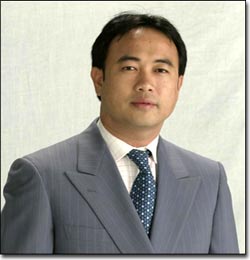China's 'long shadow' on Cambodia

The New York Review of Books has a long article this week on China’s support of Cambodia, written by a longtime foreign correspondent for the French newspaper Le Figaro. The article by Francois Hauter is behind this pay wall, but here is the opening paragraph, an excerpt and the surprising ending:
In Phnom Penh, the capital of Cambodia, the economy is going strong, but the prime minister, Hun Sen, has organized the plunder of the nation's resources for the benefit of its powerful neighbor, China, in exchange for Beijing's protection.
….
Cambodia was on its last legs when the Vietnamese invaded in December 1978, and they installed the new government dominated by Hun Sen, who became prime minister in 1985. A consummate survivor, he is still prime minister twenty-two years later. He did everything he could to prevent the public trial of Khmer Rouge leaders demanded by the United Nations. Why? Because although he had been placed in power by the Vietnamese, he had long since transferred his allegiance to the Chinese government, which had been the chief patron of the Khmer Rouge regime, supplying it with arms, food, training, and international backing. To put the Khmer Rouge leaders on trial would have been to denounce Chinese collaboration in the Khmer genocide. It would also have compromised certain tangible interests. "China is a very great country," Hun Sen declared recently. “If 1.3 billion Chinese were all to urinate at the same time, it would unleash a major flood. But China's leaders are doing good things with their partners.... When China gives, there are no strings attached. You can do what you want with the money.”
The Cambodian leaders did not fail to take advantage of the opportunity. State assets were sold off to the highest bidder. One scholar, François Mangin, has estimated that between 1993 and 1999, the Cambodian government sold concessions to more than a third of Cambodia's most productive land, mainly to foreign companies engaged in commercial exploitation of forests, mineral resources, agriculture, fisheries, and tourism.
To cite just one example: Pheapimex and Wuzishan, two companies run by the best friend of Hun Sen's wife, were given rights to develop and exploit more than 1.26 million acres of forest with logistical support from Chinese firms.
The proceeds from land confiscation which primarily involves the pillage of Cambodian forests for Chinese exploitation have been used to finance the prime minister's party and his security force, which is the only well-equipped military unit in the country (other brigades are employed in the transport of timber). Money acquired dishonestly is laundered in nine casinos now operating in Poipet, a town near the Thai border. Western governments and international aid organizations, including the World Bank and Asian Development Bank, are well aware of this phenomenal corruption.
…..
What seems to me more singular about Beijing's attitude toward Cambodia, however, is that Chinese officials have shown themselves unable to support "good" practices rather than "bad" ones. Hun Sen and his collaborators have long held Cambodia in their grip, and that has suited the Chinese Communists just fine. Beijing has also backed the despicable military government in Burma and the paranoid North Korean dictator. Whatever mad regime might serve China's interests, regardless of the suffering inflicted on the victims of those regimes, has been accepted, tolerated, and supported by the Chinese. Western diplomats have taken much satisfaction in denouncing their "cynicism."
But is it really cynicism? It is in the name of pragmatism that the Chinese do not allow moral considerations to weigh on their minds. Without any qualms, they adapt instantly to whatever situation they find, good and bad. This absolute pragmatism is the rule in the private sphere as well as for public affairs. I am reminded of what a Chinese friend told me when I expressed my exasperation at this failure to distinguish between good and evil. She answered: "My father told me, 'Be good, but not too good, or else you will die, for your place will be in Heaven, not on earth. And don't be too bad, either, or you won't deserve your place on earth." Had the balloon seller said the same thing, it might have mitigated my rage against Hun Sen's clique.
----------------------------------------

China Rises is written by Tim Johnson, the Beijing bureau chief for McClatchy Newspapers. He covers both China and Taiwan.
More about Tim Johnson
Labels: China
» Read more!





